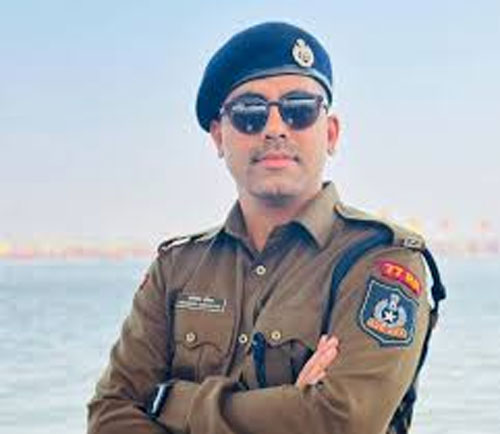Daijiworld Media Network – New Delhi
New Delhi, Oct 29: When Delhi native Abhishek Vashishtha learned that he had secured All India Rank 14 in the UPSC Civil Services Examination 2024, he was literally suspended between earth and sky. He was in the middle of a rock-climbing module in Mussoorie, part of his IPS training at the National Police Academy, when shouts from below announced his remarkable achievement. The news marked a fitting and poetic end to an eight-year-long struggle filled with perseverance, resilience, and self-belief.
Abhishek’s dream of becoming a civil servant began during his BTech days at a government college in Delhi. A professor preparing for the UPSC mains that year introduced the class to the world of civil services, explaining the opportunities to work at the grassroots level and bring meaningful societal change. This struck a chord with Abhishek, who soon realised that engineering design was not his calling. What began as curiosity gradually turned into conviction, and after completing his degree, he dedicated himself wholeheartedly to the UPSC journey.

Coming from a humble background, Abhishek witnessed his parents’ sacrifices to ensure his education. He credits them for being the foundation of his success, acknowledging their unconditional support even during times of failure. He also expresses deep gratitude to his wife and sister for their encouragement and strength throughout the journey, describing his achievement as the result of collective effort and divine grace. Being married while preparing for UPSC, he believes, helped him maintain emotional balance. He feels that having a supportive partner made the journey easier, providing someone with whom he could share insecurities and anxieties without fear of judgment. According to him, while academic preparation can be managed with discipline, it is mental stability that truly sustains aspirants through this demanding process.
Abhishek’s UPSC journey began in 2017 and extended over six attempts. In his first attempt in 2018, he narrowly missed clearing the prelims by a small margin. The following year, he cleared the prelims but missed the mains cut-off by a single mark. Although these initial setbacks were disappointing, they only strengthened his resolve. In his third attempt, he achieved success by securing a post in the Indian Revenue Service (IRS). Later attempts brought fresh challenges, including overconfidence and the disruptions caused by the pandemic. In his fifth attempt, he earned a position in the Indian Police Service (IPS), and finally, in his sixth and last attempt, he reached his ultimate goal by securing All India Rank 14. Throughout this long journey, he stayed inspired by Mahendra Singh Dhoni’s philosophy of being process-oriented, believing that success is a natural outcome of consistent effort rather than mere obsession with results.
For preparation, Abhishek adopted a highly analytical and structured approach. After his initial failure in the prelims, he carefully reviewed his mistakes and prioritised accuracy over the number of questions attempted. Analysing previous years’ papers helped him identify recurring themes and focus more on subjects such as polity, economics, and environment. For mains, he emphasised that the exam is not solely about current affairs, as a large part of it is based on static topics. He prepared concise notes that combined both static knowledge and contemporary developments, ensuring well-rounded answers. He believes answer writing is a skill developed through consistent practice, and he made it a point to structure his answers with clear introductions, logically divided paragraphs, and crisp conclusions.
When it came to the personality test, Abhishek’s biggest learning was the importance of authenticity. In his earlier attempts, he tried to mould his responses to what he thought the board wanted to hear, but later realised that being genuine, honest, and constitutionally sound in his answers made a stronger impression. Even when unsure about a question, he preferred to admit it frankly rather than attempt to bluff. He focused his interview preparation on current affairs, his service background, and significant national issues, always ensuring his opinions were backed by reason and ethics.
To aspirants preparing for the upcoming UPSC exams, Abhishek offers practical and heartfelt advice. He stresses the importance of revising high-weightage subjects multiple times, taking daily mock tests to improve accuracy and time management, and analysing previous year papers to identify recurring patterns. He insists on limiting resources to a few reliable ones and focusing on deep revision rather than constant material switching. Most importantly, he cautions aspirants against beginning UPSC preparation under pressure or external influence. According to him, internal motivation and a clear sense of purpose—knowing exactly why one wants to join the civil services—are what sustain aspirants through difficult times.
After eight years of persistence, setbacks, and self-discovery, Abhishek Vashishtha’s story stands as a powerful reminder that true success belongs to those who remain patient, grounded, and unwavering in their pursuit of purpose. His journey from IPS trainee to IAS officer reflects not only hard work but also the strength of belief that transforms obstacles into stepping stones toward success.